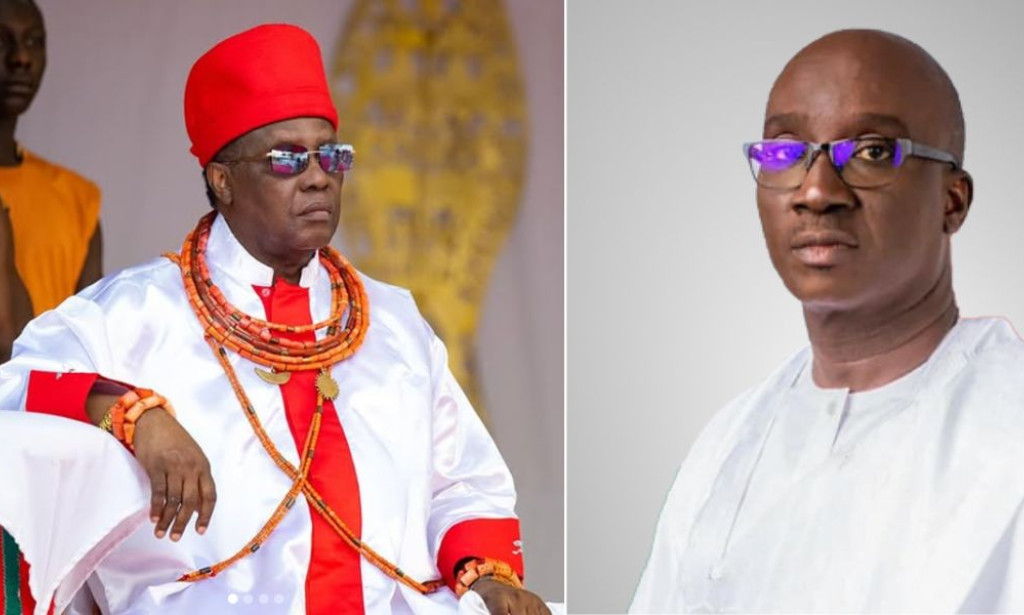A Throne in Question: The Oba of Benin, Monday Okpebholo, and the Dangerous Drift into Partisan Politics
The throne of the Oba of Benin is one of the most revered in Nigeria, steeped in centuries of tradition, cultural pride, and symbolic authority. But that authority depends on one essential condition: neutrality. When a monarch begins to take political sides, the very institution that binds the people together begins to fracture.
Allegations have emerged that the Oba of Benin is openly backing Monday Okpebholo in a contested political race—despite strong indications that Okpebholo did not win, not even at the polling unit within the palace grounds. That polling unit result is damning: it suggests that even the chiefs, elders, and members of the royal household chose not to support the candidate the Oba is now reportedly endorsing. More troubling still are claims that the Oba may have directly lobbied for Okpebholo’s political legitimacy in the recent Tribunal Verdict..
If true, these actions represent a serious breach of the boundaries that separate monarchy from politics. They mark a shift from royal statesmanship to political favoritism—something that history has shown repeatedly to be a dangerous path.
A Line That Should Never Be Crossed
Monarchs are meant to be guardians of culture, tradition, and unity—not political agents for any party or candidate. When a king chooses sides, he immediately alienates part of his people. He turns a symbol of unity into a tool of division.
The throne does not exist to secure political office for anyone. It exists to remain above politics. If the Oba of Benin is indeed championing a candidate who failed to secure support even at the palace gate, then the legitimacy of that endorsement—and the throne itself—comes into question.
In a democracy, loyalty to the people outweighs loyalty to power. The people have the right to raise their voices, especially when they see their monarch act in ways that contradict the very values his position is meant to uphold.
History Has Been Here Before
Monarchs who get involved in politics often pay a heavy price. The examples are not ancient tales—they are recent, real, and brutal.
Emir Muhammad Sanusi II (Nigeria, 2020): Dethroned by state authorities after repeated tensions that many tied to political disagreements and public criticism of government policies. A revered intellectual, but one whose political involvement led to his downfall.
King Gyanendra (Nepal): Took over executive powers in 2005, suspended democracy, and interfered in governance. Within a few years, the monarchy was abolished altogether.
Shah Mohammad Reza Pahlavi (Iran): His alliance with foreign interests and deep involvement in national politics alienated his people, triggering the 1979 revolution that ended monarchy in Iran.
King Farouk I (Egypt): Accused of political interference and corruption, he was forced to abdicate after a military coup in 1952. His dynasty was replaced by a republic.
The lesson is the same each time: the moment a throne becomes a campaign podium, it loses its moral authority.
The Right to Question Royalty
Some may argue that monarchs are beyond public criticism. But this is not the era of blind obedience. Citizens who raise their voices against political partisanship from their traditional rulers are not disrespecting the throne—they are defending it. Silence in the face of politicised royalty is not loyalty; it is complicity.
A monarch’s true strength lies in his ability to unite people across party lines, across tribal divisions, and across economic classes. The throne must be a refuge from the chaos of politics, not a participant in it.
If these allegations against the Oba of Benin are true, then the future of the throne itself may be at stake. What’s at risk is not just reputation—it’s relevance. A king who becomes a political actor ceases to be a unifier and becomes a liability to the very institution he was born to protect.
The people of Benin deserve better. They deserve a monarch who listens to the voice of all his subjects, not just the political elite. They deserve a throne that rises above the ballot box, not one that becomes entangled in its controversies.
Royalty must never forget: power without restraint is not leadership—it’s decay. And if the Oba of Benin is indeed playing politics, then the people have every right—perhaps even the duty—to speak out before the crown becomes just another campaign tool.



You must be logged in to post a comment.